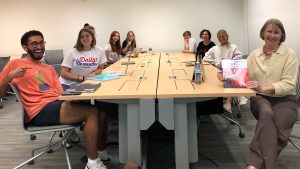Students Review, Examine Historic Presidential Contest
By: Eugenio Mulero, Adjunct Faculty, Department of Communication

Political journalism students discuss the 2024 election in the classroom with former NPR correspondent Pam Fessler. Photo by: Eugenio Mulero
It’s easy to view the 2024 presidential election as historic. Since the start of the year, the country has witnessed a torrent of plot twists from the major party’s campaigns.
With millions of Americans casting their votes to determine the Oval Office’s next occupant, Vice President Kamala Harris and former President Donald Trump, and their teams, promised different visions for Americans for the next four years.
Political journalism students at George Mason University’s Department of Communication have been tracking this consequential moment in the nation’s history. Since late summer, the contest between the Harris-Walz and Trump-Vance campaigns has served as the political journalism class’ primary case study.
To arrive at a better understanding of the media arena and political landscape, students crafted analytical features on policies ranging from voter demographics to immigration. They also covered high-profile press conferences, highlighted polling and campaign finance data and are finalizing in-depth profiles of Harris and Trump.
On Election Day eve, members of the class collaborating with Mason Votes reflected on their reporting:
“One of the biggest things I learned this election cycle was how much politics does have a role in everyday life,” said Madalyn Godfrey, a communication major with a concentration in journalism and public relations. She has a minor in political communication.
“Not only is this the first presidential election that I am voting in, but this is a very historical election as well. We have two candidates that if Harris wins then she is the first woman president, which is great, you know. And then if Trump wins, then you’re having a president since [President] Grover Cleveland who won a two non-consecutive term.” Godfrey explained she also has gained a deeper appreciation of federal contests’ role in shaping state and municipal policymaking.
For her, this race has been partly marked by demographic diversity. As she put it, “I think what I really love about this election cycle is there is a little bit more of an emphasis towards Gen Z.” Specific to news coverage, studying the major candidates’ social media strategies has revealed that focus: “Not only are these candidates reaching out to Gen Z in these ways, but they’re receiving free national attention through other people using these soundbites.”
Lauren Splett, a government and international politics major with a minor in political communication, also studied the campaigns’ social media strategies: “Sending out polls through, like [X], Instagram, Facebook—something like that is seeming to get to that younger crowd of voters.”
Splett described Trump’s attempted assassination as a “scary moment for democracy.”
“That was definitely an ‘oh-my-gosh, I-can’t-believe-this-is-happening’ moment that I think changed the course of the election,” she observed. During a campaign rally in Pennsylvania on July 13, the former president was injured on his right ear by a 20-year-old man killed by the Secret Service.
Overall, the Harris v. Trump election enhanced Splett’s understanding of news outlets. “I’ve always really been interested in how the media affects and interacts with the election cycle,” she said. “That’s partially why I wanted to minor in political communication, because that’s always spoken to me. … So I really learned a lot about how the media has affected these candidates.”
For Brandyn Fragosa, a communication major with a concentration in journalism, examining the Trump campaign’s immigration proposals helped expand his perspective about national political systems. By crafting comprehensive analyses of the former president’s calls for additional border protections vis-a-vis certain supporters’ anti-migrant rhetoric sharpened his approach to journalism.
“Since my policy point is immigration, I’ve been able to dive into all these documents, pull quotes from Donald Trump as well as … speakers at his rallies,” Fragosa said, pointing to the portfolio he’s produced this semester.
A memorable moment for him was President Joe Biden’s decision this summer to drop out of the race. Fragosa recalled: “I was driving at the time and I just remember my phone blowing up; being like, ‘Look at the news. Look at the news. This is crazy. This is huge.’ Like, ‘we don’t know what we’re going to do. This is insane.’ But then eventually Kamala stepped up.”
Prof. Mulero teaches political journalism. He is a professional journalist covering Congress and national politics.
_____________________________________________________________
Photo by: Eugenio Mulero
